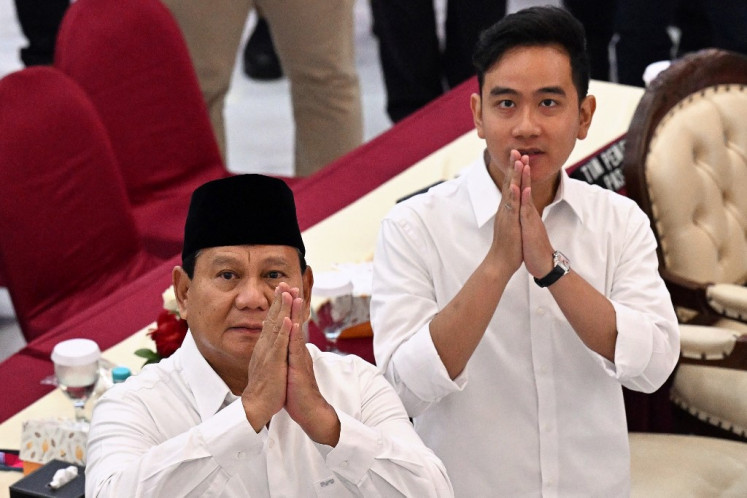Additional incentives to accelerate oil, gas exploration
The government has said that it plans to accelerate oil and gas exploration by providing fiscal incentives
Change Size

The government has said that it plans to accelerate oil and gas exploration by providing fiscal incentives. The statement was made recently by Andang Bachtiar, the head of the National Committee for Exploration (KEN) in a press conference that was attended by Energy and Mineral Resources Minister Sudirman Said.
The committee has recommended that the exploration period be accelerated from six ' 10 years to 3.5 years by providing, among other incentives, progressive production splits and simplifying permits.
According to Andang, in the current low commodity-price environment it is timely for Indonesia to accelerate exploration activities. The committee has also recommended the opening up of oil and gas data and the continued evaluation of the remaining potential in concessions that have expired.
This optimistic view is also based on the premise that there are still considerable prospects for new oil and gas reserves in Indonesia, particularly in the deep seas and remote areas. The reserve replacement ratio (newly discovered reserves versus production) in the next five years could increase to 100 percent.
In supporting the statement, Andang indicated that in 2015 Indonesia added 398 million barrels of new oil reserves as compared with production of 287 million barrels, so the reserve replacement ratio is over 100 percent.
On the other hand, many also believe that given the minimum data available, the prospects for finding new oil and gas reserves in Indonesia, including in frontier areas, are difficult to estimate.
Also, actvities in those prospective areas have higher risks and require larger amounts of funding and specialized technology supported by dependable manpower.
Another unfavorable factor includes the relatively small volume of initial oil-in-place as compared to that in the Middle East and Afrcia. Figure 1 shows the distribution of estimated initial oil-in place in oil fields that have been discovered in Indonesia (1986 data), which shows the relatively small initial oil place (50 percent is below 40 million barrels and only 10 percent above 300 million barrels), as compared to the Middle East and Africa.
Such constraints are reflected in the oil production graph, which showed a high sensitivity to exploration activities (Figure 2). Like Venezuela, Indonesia also saw a decline in investor interest in upstream oil activities that, according to a PriceWaterhouseCoopers' study (2002 and 2005) was not attributable to a decline in investors' perception of Indonesia's resource potential, the fall in oil prices or political instability, but mainly was caused by the uncertainty in contract execution.
The factors affecting investment in Indonesia are related to new regulations that are imposed on existing contracts, uncertainties in tax and import duty regulations and other tax issues.
The roll out of regional autonomy since 2001 has also prompted regional administrations to issue regulations or bylaws that contradict Production Sharing Contracts (PSC) awarded by the central government.
Issues related to regional autonomy arise because there are differences in the substance of authority between the Regional Autonomy Law and sectoral laws. The implication being that the regional laws often contradict laws issued by the central government.
Moreover, in addition to these external factors problems in the execution of PSC have arisen due to differences in contract interpretation or because there has been no consistency in the interpretation of contractual terms.
For example, one item of controversy is associated with Government Regulation No. 79/2010 on cost recovery claims, which has essentially changed PSC terms.
The controversy has developed as oil production continues to decline, while the cost recovery claimed by the contractors has increased both in amount and in the categories of expenditure.
Indonesia still depends largely on foreign capital for the oil and gas business in view of the high risks involved, but foreign oil and gas investors seek business that is conducive to providing good returns.
Accordingly, investors will direct their capital resources toward countries where opportunities are available to provide the best returns on investment.
Also, investment in such a high-risk business as oil and gas prospecting requires a conducive business climate not only in the form of improved production splits, but equally importantly in legal protection and certainty.
Such legal certainty is an absolute necessity, in view of the obvious characteristics of oil and gas upstream activities where exploration and development of natural resources require a long time and so require considerable time to see benefits from development.
Investment will grow if the legal system can provide predictability, stability and fairness. This means that the law should generate certainty and accommodate or balance the conflicting interests to maintain stability and fairness.
The oil and gas industry would certainly welcome government initiatives to provide new incentives for accelerating oil and gas exploration activities.
However, financial incentives alone may not be sufficient to attract risk capital, as Indonesia is also competing with other countries with potential hydrocarbon resources that also need investment, the improved climate should also include less bureaucracy.
_______________________________________
The writer is a director at an energy development process consulting company in Jakarta and a member of Indonesia's National Arbitration Board (BANI). The views expressed are his own.









